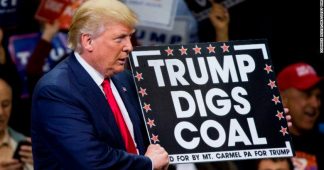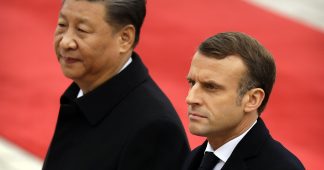Biden’s team is split on how to think about climate change
By Robinson Meyer
The moderate Democratic president wanted the United States to tackle climate change, and he had pledged to get serious about it during the recent campaign. On the president’s desk sat a memorandum laying out two options.
One set of officials—those who worked at the Department of Energy and Environmental Protection Agency—urged the president not to worry, for now, about how developing countries such as China and India acted. Most important for an issue as important and unwieldy as climate change, these advisers said, was that the U.S. be willing to slash its emissions alone, should it fail to wrangle international commitment first.
But another team, composed of White House economists, insisted that climate change was essentially a global free-rider problem. Although all countries would benefit from American efforts to reduce greenhouse-gas pollution, only the U.S. would pay for those efforts. The U.S. should avoid this outcome, they said, by conditioning its domestic climate policy on foreign action: If other countries didn’t reduce their carbon emissions, then neither would America.
Yes, President Bill Clinton faced a hard choice in 1997, about how the U.S. should handle the then-upcoming United Nations talks on climate change.
Four administrations later, President Joe Biden, too, is weighing the relative power of climate diplomacy and unilateral U.S. action. This past weekend, negotiators from the U.S. and China—including John Kerry, America’s special climate envoy and former secretary of state—hammered out a brief statement committing to further climate action. And later this week, the Biden administration will announce the country’s new emissions-reduction commitment under the Paris Agreement. Activists and environmental groups are pressuring Biden to commit to cutting U.S. climate pollution 50 percent by 2030, as compared with its historic peak. This might be one of the most important weeks in U.S. climate policy this year.
But note that I say “might be.” I’m not convinced. In a prior administration, these announcements would have been major victories. This week, Biden will be lucky if they merely whelm. They feel not just unsurprising, but out of step with the rest of his climate policy. Why is that?
A significant part, I would argue, is that the ideas underpinning this week’s ceremony are simply outdated. Reading news of the China talks, I thought of a recent paper by the political scientists Michaël Aklin and Matto Mildenberger. They argue that, since the 1990s, policy makers and academics have conceived of climate change in a mostly useless way. Officials have taken their cues from economists and imagined climate change as a free-rider problem, in which the goal is to prevent nations from taking advantage of one another.
In fact, Aklin and Mildenberger say, climate change is a distributive-conflict problem—a term that was new to me and that I will now explain. In essence, climate policy restructures the economy, creating new economic winners and losers. This is familiar enough: Coal mines suffer; electric utilities prosper. Because political leaders want, above all, to maintain the support of key constituencies, climate policy flows from a societal negotiation between potential winners and potential losers, a fight between climate reformers and climate obstructionists. The challenge of global climate action isn’t that other people will benefit from your emissions cuts; it’s that many interests actively oppose decarbonization. The key to passing climate policy is stitching together a coalition that will support and sustain decarbonization.
Surveying the past few decades, they find that countries almost never care about free riding. “Governments implement climate policies regardless of what other countries do,” they write, “and they do so whether a climate treaty dealing with free-riding has been in place or not.”
The Trump presidency showed this effect at large, Mildenberger told me in an interview yesterday. When Donald Trump took the U.S. out of the Paris Agreement, other nations did not react by withdrawing as well. Instead, revulsion at Trump himself—and his climate views by proxy—strengthened political support in those countries for continuing climate action.
What’s interesting is that both Aklin and Mildenberger’s coalitional idea and the free-rider conception of climate action seem to operate within the Biden administration. The president’s domestic-policy staff, epitomized by his adviser Brian Deese, is pursuing coalition-building climate policies, primarily characterized by public spending. The policies spread the economic gains of decarbonization around and increase the Biden coalition’s support for further action. An older guard, epitomized by Kerry, hopes to secure other countries’ involvement as well, in order to prevent free riding. You can see the roots of this disagreement in the Clinton memo nearly a quarter century ago.
Whose theory is better? Neither seems necessarily awful to me. Kerry’s approach actually fits within Deese’s: Securing foreign climate commitments makes the task easier at home.
But I do find the coalitional hypothesis a more useful guide to explaining the world. And the reason can be found, again, in U.S.-China climate relations.
During the run-up to the Paris Agreement, in 2014, the two countries reached a joint agreement to cut their emissions. It was a huge deal. This agreement conveyed the seriousness of both countries; it showed that the world’s two largest polluters wanted a good outcome from the Paris talks. But the announcement was more important for what it made possible politically. In the U.S., China’s involvement allowed Barack Obama to fend off domestic arguments that climate policy would sacrifice American competitiveness with China; meanwhile, America’s engagement with China as an equal increased the country’s international position and shored up Chinese-elite support for climate action. Free riding wasn’t really at issue here; the agreement’s clearest advantage was that it made each country’s domestic climate politics easier.
Contrast that scene with now. The Biden administration has sold climate action as concretely in America’s interests: Its infrastructure package seeks to develop green industries not out of a sense of global do-goodism but because America’s economic competitiveness is at stake. And Xi Jinping’s government has, since last year, pursued aggressive climate policy as a way to build its international prestige. China uses climate policy to sell the orderliness and sanity of its system over the cacophonous and chaotic American approach.
So the weekend’s announcement seemed anticlimactic, to be honest. Of course the Biden administration and the Xi government now say they want further emissions reductions in the 2020s: Both governments are already acting domestically as if climate action is in their concrete interests. We would not be surprised—it would not be newsy in the least—if China and America said they both want to see more economic growth in the 2020s. Xi and Biden seem to understand decarbonization as a positive economic process; why would we be shocked that they both want more of it?
As decarbonization progresses, I think more officials will naturally understand the climate challenge in the frame of coalition building, not free riding. The question for me is whether—during this transition period—the politics of free riding help or hinder Biden’s attempt to forge a stronger pro-decarbonization coalition. If Biden commits to slashing greenhouse-gas emissions by 2030, will that make the public pay more attention to—and feel more skittish about—the rest of his climate-policy playbook? Will nervousness about his policies kick in before the policies themselves pass Congress? I suppose we’ll start to find out this week.
Published at www.theatlantic.com











